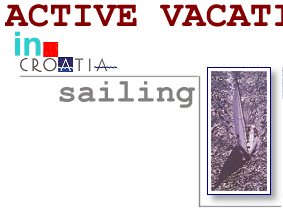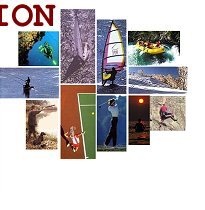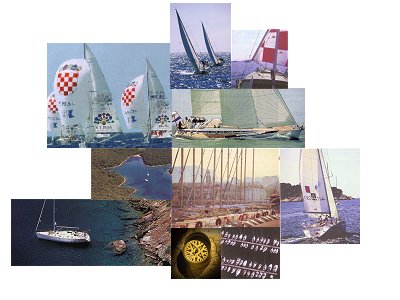 |
General Information
 |
Croatia is ideal for sailing: it has an indented
coastline, many islands, a good climate and 40 marinas with
excellent facilities and service. About half of the marinas belong
to the ACI Club (Adriatic Croatia International Club) and the others
are independent. Of the twenty-one ACI marinas seventeen are open
throughout the year and four during the summer season only.
All Croatian marinas are members of an association whose head
office is in Rijeka.
Croatian Marinas Association (Hrvatska udruga
marina)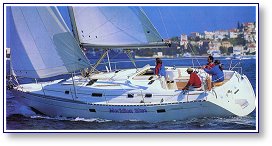
Bulevar oslobođenja 23
HR-51000 Rijeka
Tel.:
(051) 209 147, 209 146 / Fax: (051) 216 033
The head office
of the ACI Club is in Opatija.
ACI Club
M. Tita 221
HR - 51410 Opatija
Tel.: (051) 271 288, 272
570 / Fax: (051) 271 824, 712 824
Details
about marinas (their options, prices, addresses) could be find using
our advance search
facility on Marinas
Page. On this page you can also find a lot of information about
mooring fees, buying food, fuel stations, spare parts, water and
electricity in harbours and marinas.
If you need information
about legal regulations: access, navigation and stay, authorization
issue, navigation security compensation, paying demurrage, currency
regulation, yahtmaster's certificate, wintering of yachts in Croatia
zones in which navigation is prohibited, boat equipment, radio
telephones, participation in sporting events, transport of boats,
boat rental & charter companies, change of crew, visit Nautical Regulations
Page.
The Croatian Coast
 |
Geography
From Rt Savudrija
(Istria) to Rt Ostri (on the western side of the entrance to the Bay
of Kotor), the Croatian Adriatic coast extends for 528 km as the
crow files. The total length of the coastline is about 5,800 km.
Climate
Due to its north-southward
thrust and its geological structure, there are considerable climatic
differences between the northern and the southern parts of the
Adriatic coast. The prevailing northerly, the bora, can also produce
big differences in temperature. Sea temperatures generally range
between 12o C in February and 25o C in August. Although frost is
rare in this part of the world, short periods of cold weather with
snowfall are not uncommon in the northern part of the coast.
The best season for sailing is early summer: there are good
winds in May and June. In July are August, when periods of calm
prevail, conditions are ideal for those motor boat fans who prefer
calm waters. In the autumn and winter, seas can be rough with
prolonged periods of the bora and the scirocco (see also section
Weather).
Weather
 |
Weather conditions in the Adriatic are affected by
the general weather situation in the Mediterranean and local climate
conditions.
Generally speaking, light to moderate winds with
few storms prevail until June. In July and August, a period of calm
sets in and storms are more frequent. From September on winds are
again stronger.
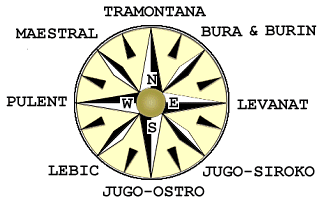 The bura (bora) and the
jugo-siroco (jugo-scirocco) are the
main winds on the Adriatic. They prevail in the winter period from
September to May. The prevailing wind in the summer is the
maestral. The bura (bora) and the
jugo-siroco (jugo-scirocco) are the
main winds on the Adriatic. They prevail in the winter period from
September to May. The prevailing wind in the summer is the
maestral.
The bora is a
cold and dry north-easterly wind. It blows from the continent, i.e.
from the eastern side of the Adriatic towards the open sea and
brings bright weather. It starts abruptly and blows in squalls
toward the sea. It is strongest in the Velebit Channel and the Gulf
of Trieste. Picture shows typical "bura" corridors:
(1) Golf of Trieste, (2) Kvarner,
(3) Velebit Channel, (4)
Sibenik, (5) Split - Makarska, (6)
Peljesac and (7) Dubrovnik. In the summer the
bora blows as a local wind and then lasts only a few days. In
the winter it may continue for six to fourteen days.
The
jugo is a warm, humid east-southeast wind. It is
accompanied by heavy clouds and rain. It is not a sudden wind like
the bora but takes 36-38 hours to develop. It blows
throughout the Adriatic. In the summer it may appear as a local wind
and is more frequent in the southern part of the Adriatic. Between
March and June it blows in the north as well.
A sudden
change from the jugo to a violent bura is not unknown. The
possibility must not be forgotten when the anchorage is open to the
northeast.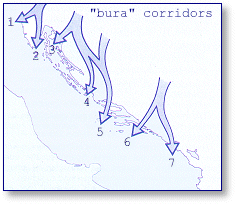
The maestral is a local wind
which blows from the sea, mostly in the summer. It usually starts
between 10 and 11 in the morning and reaches its greatest strength
between 2 and 3 in the afternoon to die down at sunset. It brings
good weather. It is usually accompanied by white clouds.
Other winds
The
burin, a north-easterly, blows in the summer from the
mainland.
The tramontana is a type of
bora; it is a northerly.
Another type of bora
is the easterly levante.
Pulenat blows from west and
lebic from south-west.
The
nevera, a violent westerly, comes as a storm or
squall. In the summer months, storms in the Adriatic are sudden and
violent and produce a short-lasting swell. The Adriatic storms have
an advantage:they do not last long and some of them leave behind
pleasantly cool air.
During periods of high pressure, the
Adriatic also has the classical rhythm of winds: winds from the land
during the night and from the sea during the day.
Weather reports
The coastal
radio stations broadcast weather reports in Croatian and English
several times a day. The reports include a general weather situation
report, messages and the forecast for the following 24 hours.
Weather reports are broadcast at the following times (in
UTC; UTC + 1 h = CET; CET + 1 h = CE summer time):
Rijeka
Radio VHF Channel 24 - 05.35 14.35 19.35
Split Radio VHF
Channels 21, 23, 07, 28 - 05.45 12.45 19.45
Dubrovnik Radio VHF
Channels 04, 07 - 06.25 13.20 21.20
There are three coastal radio stations on the
Croatian coast, which opeate the radio communications service
(telephone calls) and broadcast weather reports and warning
announcements.
The coastal radio stations operate from 0 to
24 hours on the following VHF channels:
Rijeka
Radio (9AR) channels 16, 24, 20 4
Split
Radio (9AS) channels 16, 21, 23, 07, 70, 81 ,
Dubrovnik Radio (9AD) channels 16, 07, 24.
NAVTEX - Split Radio (9AS) B1 Ident.= Q , Freq.=518 kHz,
Range=85 Nm, Time (UTC) 02.40 06.40 10.40 14.40 18.40 22.40 ,
Language=English
Each coastal radio station has transmitting
and receiving stations on serval locations. If contact is not
established on one of the channels, other channels should be tried.
Harbourmaster’s offices can usually be contacted on VHF
Channel 10, marinas on Channel 17.
Nautical warning
messages with information on obstacles to navigation,
lighthouse failures, prohibited areas, etc., are broadcast by
coastal radio stations after the weather report.
A number of official publications and pilot books
on the Croatian Adriatic coast are available. They include among
others:
Official books Mediterranean Pilot Vol. III Edition
1988 with Suppl. 3/1995
Yachtfunkdienst Mittelmeer edited by
Bundesamt fur Seeschiffahrt und Hydrographie (in German)
Admirality List of Lights, Vol. E: Mediterranean Sea, Black Sea
and Red Sea Edition 1996.
Croatian, English German and Italian charts are
aviable for the Adriatic. In our experience, charts published by the
country of origin are usually the most reliable. Croatian charts are
available in Croatian marinas and harbours:
NORTH
SHIELDS
John Liley & Gillie Ltd
Clive Street,
North Shields, Tyne & Wear NE29 6LF
T.+44(0) 191 258 3519
FX.+44(0) 191 257 1521 TX, 53600 GILLE G
ST
IVES(CAMBS)
Imray Laurie Norie & Wilson Ltd
Wych House, The Broadway, St Ives, Cambs PE 17 4BT,
T.+44(0)
1480 462114 FX.+44(0) 1480 496 109 TX. 329195 IMRAYS G
ABERDEEN
Thomas Gunn Navigation Services 62
Marischal Street, Aberdeen AB1 2AL
T.+44(0) 1224 595045
FX.+44(0) 1224584402
HULL
B Cooke & Son
Ltd Kingston Observatory,58-59Market Place, Hull, Humberside HU1 1RH
T.+44(0) 1482 223454 FK.+44(0) 1482 219793 TX. 597636 COOKES G
LIVERPOOL
Dubois Philips & McCallum Ltd
Oriel Chambers, Covent Garden, Liverpol L2 BUD
T.+44(0) 151 236
2776 FX.+44(0) 151 236 4577 TX. 627424 DUBOIS G
LONDON
Kelvin Hughes Charts & Maritime
Supplies New North Road, Hainault, Essex IG6 2UR
T.+44(0) 181
500 6166 FK.+44(0) 181 559 8535 TX. 884934
NETHERLANDS
Datema - Delfzijl BV
Oude
Schans 11, 9934 CM DELFZIJL
T.+31(0) 5960 13810 FK.+31(0) 5960
15245 TX. 53255 DATE NL
Kelvin Hughes Observator BV
Nieuwe
Langeweg 41, 3194 DC Hoogvliet P.O. Box 613, 3190 AN HOOGVLIEUT
ROTTERDAM
T.+31(0) 10416 7622 FX.+31 (0) 10416 7218 TX. 26545
OBMAR NL
NORWAY
A/S Navicharts Masteveien
3.
P.O. Box 31, N-1483 SKYTTA
T.+47 67 06 1150 FX. +47 67 06
0015 TX. 77739 CHART N
Nautisk Forlag AS
Drammensvn 130,
Skoyen, 0212, OSLO 2
T.+47 22 55 84 80 FX. +47 22 56 23 85 TX.
76164 NHST N
SWEDEN
Nautic Centre AB
Skeppsbroplasten 1, S411 18 GOTEBORG
T.+46(0) 31 112421 FX.
+46 (0) 31 115357 TX. 21785
NAUTIC S Nautiska A/B
Slussplan
5, Box 15410, S-104 65 STOCKHOLM
T.+46(0) 87 366005 FX+46(0) 87
366001
BELGIUM
Bogert navlec NV
37 Oude
Leenwenrui, ANTWERPEN, B2000
T.+32(0) 32 328532 FX.+32(0) 32
27295 TX. 33 962 BOGERD B
DENMARK
Iver
Weilbach & Co A/S
Toldbodgade 35, KOBENHAVN DK 1253
T.+45 33 13 5927 FK.+45 33 93 5927 TX. 19709 ICWCO DK
Croatian coastal charts and yachtsman’s charts are always
available at:
BADE & HORNIG GmbH,
Herrengraben 31, D-20459 Hamburg
Phone+49(0) 403 74 81 10
Fax +49(0) 403 66 40 0.
List of
British Charts for the Adriatic Sea
| Nr. |
Titel |
Scale 1: |
1440
186
187
188
196
200
201
202
204
220
269
515
1426
1471
1574
1580
1996
2711
2712
2719
2773
2774 |
Adriatic Sea
Bar and Brindisi
to Vieste
Punta Silo to Brindisi
Entrance to the
Adriatic Sea incl. Nisos Kerkyra
Bar to Split including
Otok Palagruža
Otok Lastovo to Split and Vieste to
Civitanova
Rt. Kameniak to Novigrad,
Novigrad
Porec
Kvarner, Kvarnerić and Velebitski
Kanal
Sedmovraće to Trieste and Visite to
Civitanova
Otok Vis to Otok Susak and S.Benedetto del
Tronto to Ravenna
Ploče and Split with adjacent
harbours
Luka Ploče, Split
Splitska Vrata
Zaljev
Vela Luka
Pakleni Kanal, Starigradski Zaljev, Zaljev Klek
Neum
Zadar to luka Mali Lošinj
Luka Mali Lošinj
and ports and harbours on the coast of Istra
Izola, Koper
Rovinj
Luka Mali Lošinj
Luka Pula, Zaliv
Raša
Golfe de Trieste
Otok Glavat to Ploče and
Makarska
Otočić Veliko Skolj to Otočić Glavat
Ports in Rijeka Zaliv
Rijeka: Luka Martinšćica
Barakarski Zalev
Omišalj including Uvala Sapan
Rogoznica to Zadar
Zadar
Otok Susac to Split
Rt. Marlera to Senj including approaches to
Rijeka
Senj
Luka Cres
Šibenik, Pašmanski Kanal,
Luka, Telaščica, Sedmovraće, Rijeka Krka
Šibenik,
approaches Pašmanski Kanal and southern approaches;
Sedmovraće Luka Telašćica
Rijeka Krka
Otok Vis
to Šibenik |
1.100.000
300.000
300.000
300.000
300.000
300.000
100.000
10.000
100.000
300.000
300.000
15.000
20.000
30.000
35.000
100.000
10.000
20.000
25.000
30.000
100.000
100.000
100.000
10.000
12.500
15.000
100.000
20.000
100.000
100.000
5.000
12.500
30.000
40.000
50.000
100.000 |
Croatian Seacharts
Croatian seacharts are published by
HRVATSKI
HIDROGRAFSKI INSTITUT
Zrinjsko Frankopanska 161,
HR-21000 SPLIT, Croatia
T.+385 (0)21 361 840 FX.+385(0) 21 347
242
They are aviable from
PLOVPUT
Obala
Lazareta 1, HR-21000 SPLIT, Croatia
T.+385 (0)21 355 900
FX.+385(0) 21 585 782
Prisavlje 14, HR-10000 ZAGREB, Croatia
T./Fax.
+385(0) 1 6196 480, 6196 481

The best season for
sailing in Adriatic is early summer: there are good winds in
May and June. In July are August, when periods of calm
prevail, conditions are ideal for those motor boat fans who
prefer calm waters. In the autumn and winter, seas can be
rough with prolonged periods of the bora and the scirocco, the
real paradise for those who like "real sailing".
|
| Nr. |
Titel |
Scale 1: |
100 - 15
100 -
16
100 - 17
100 - 18
100 -
19
100 - 20
100 -
21
100 -22
100 -
25
100 - 26
100 -
27
100 - 28
100 - 29
100 - 30 |
Grado - Rovinj
Pula -
Kvarner
Pula
Lošinj - Molat
Rijeka -
Kvarnerić
Silba - Pag
Pag
Zadar
Dugi otok - Zadar
Šibenik - Split
Splitska vrata
Jabuka - Vis
Hvar -
Lastovo
Brac - Hvar
Makarska
Peljecac -Mljet
Luka Polače
Luka
Slano
Prolaz Harpoti
Dubrovnik - Budva
Cavtat
Budva - Ulcinj
Petrovac
Ulcinj
Ulcinj - Durres |
100.000
100.000
30.000
100.000
100.000
100.000
5.000
15.000
100.000
100.000
15.000
100.000
100.000
100.000
10.000
100.000
20.000
15.000
20.000
100.000
15.000
100.000
25.000
10.000
100.000 | |
Coastal radio stations (Rijeka Radio, Split Radio
and Dubrovnik Radio) receive messages round the clock (from 0 to 24
hours) on VHF-channel 16 and on the following channels:
Rijeka Radio 21, 40, 4
Split Radio 21, 23, 07, 28
Dubrovnik Radio 07, 04
Harbourmaster’s offices and
marinas can usually be contacted on VHF- channel 17, at least during
th day. Most Harbourmaster’s offices have their own patrol boats,
with which they can help boats in distress even in bad weather. In
keeping with international custom and practice, harbourmaster’s have
the right to engage the help of every suitable ship, including
foreign yachts.
Note: No official agency is tuned in to
CB-channels. Distress calls have therefor little chance or being
received by rescue services. |
![]()
![]() welcome...
welcome...